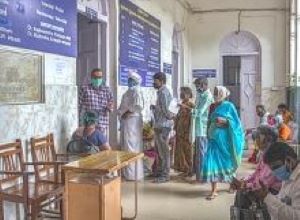In India, relentlessly rising case numbers are causing another emergency – serious mental health problems among COVID-19 patients, reports BBC News.
Many recovering coronavirus patients in India are experiencing mental health distress, said Dr Vasant Mundra, a senior psychiatrist at Mumbai's PD Hinduja Hospital, particularly those who were on a ventilator or spent a long time in an ICU. "The brain is already exhausted by the time you get to the hospital. And then the mayhem of the COVID wards overwhelms your senses," Mundra is quoted in the report as saying.
COVID-19 patients are not allowed to meet family and they don't get to see the faces of their doctors and nurses, who are wearing protective masks at all times. That was disrupting patients' ability to form trust with their doctor, said Dr A Fathahudeen, the head of the critical care department at Ernakulam Medical College in southern India, in turn disrupting their recovery.
Recovery from coronavirus can be a lonely experience, and doctors say when a patient experiences life threatening events as well the chance of post-traumatic stress drastically increases. Symptoms include depression, anxiety, flashbacks, and hallucinations, Mundra said.
And yet, mental health issues associated with coronavirus patients are not getting enough attention, BBC News reports doctors warn. There are few mentions in government press conferences or in the media. Prominent mental health expert Dr Soumitra Pathare said he was not surprised. "What you are seeing during the pandemic is a reflection of India's poor investment in mental health facilities," he said.
The report says India lacks facilities and experts to treat mental health patients, and the situation is worse in smaller towns where people are often not able even to recognise symptoms. If the government failed to recognise and address the problem soon India would be facing a "mental health pandemic", Pathare said. A good starting point would be making people more aware of symptoms, he said. And the next step would be to improve mental health facilities, especially in smaller towns. "I am aware it won't happen overnight, but we have to start somewhere," he said.
Kamna Chhibber, the head of the mental health department at Fortis Hospital in Delhi, said she had witnessed a sharp rise in the number of people reaching out for help during the pandemic. A long lockdown, uncertainty over the future, and the need to be constantly alert had made people more anxious, and more people were coming to the hospital to talk generally about anxiety and depression, Chhibber said. The problem was becoming "more serious with each passing day", she said.
The report says doctors are now urging for mental health to be addressed as part of post-COVID treatment protocols. Each hospital needed to do something, said Fathahudeen, or "we may save people from COVID but lose them to depression and PTSD".
[link url="https://www.bbc.com/news/world-asia-india-54163109"]Full BBC News report[/link]

